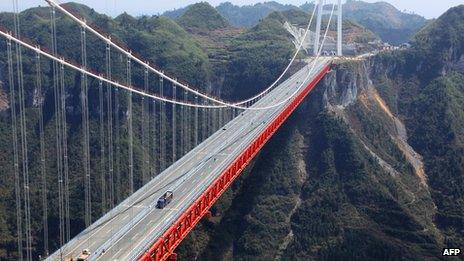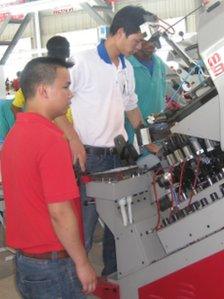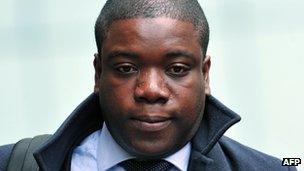The year in business: 2012
- Published

Many of China's infrastructure projects are not commercially viable
2012 was the year when shocking economic and business news seemed to lose its power to shock.
Nothing much really got sorted out - the debt mountains in Europe and the US still towered over everything; scandalous behaviour at big western banks continued to hit the headlines; China again failed to make progress in rebalancing its lop-sided economy.
As voters in the US went to the polls and the Chinese communist leadership underwent its once-in-a-decade refresh, it could have been a year of change for the world's two biggest economies.
But continuity was the watchword.
President Obama was returned to the White House, but without the votes in Congress to force his ideas through. while China's new 59-year-old leader Xi Jinping indicated no discernible shifts in priorities.
Chinese conundrum
For more than a decade, economists have been deeply concerned about China's vast trade surpluses.
China's ability to manufacture almost everything more cheaply and reliably than before has made shopping cheaper for tens of millions of consumers all over the world.
But it seemingly all went too far.
Everyone agrees that more money now needs to find its way into the pockets of Chinese consumers, which would enable the country's growth to rely less on exports and also make it less dependent on investment in more and more factories.
The respected economist Michael Pettis at Peking University warns that the imbalances in the Chinese economy have become "extreme" and there is now an urgent need for reform.
"China has been investing so much that it has become very clear that for at least the last few years, and some of us believe for a lot longer, that investment has been misallocated," he says, "We are investing in projects whose true economic returns don't justify the investment."
He points to the central part of the country, which is filled with brand new airports that get very little traffic, yet more airports are being built.
"We have a bridge in Qingdao, which, if it were straight, would be long enough to cross the English Channel. It's not straight, it's curved, which is much more expensive, but they did it because they thought it would be more beautiful that way. But unfortunately, it receives very little traffic," he laments.
China continues to expand its capacity to manufacture lots of things the world does not really need more of - such as ships and steel.
So why doesn't China invest to help the millions of people in dire poverty, doing things inefficiently, in subsistence farming - projects which could bring those people into an efficient economy and get genuine growth?
"The problem there, is the investment that would be necessary for this to happen involve long-term investments that don't generate much result in the short-term," Mr Pettis explains.
"Everyone agrees that there should be a significant expansion in schooling for the very young in the poor areas of China and that certainly make sense. But, when you invest money in schooling or in social housing, the returns don't come for 10, 20, 30 years, whereas the cost is accrued today," he says.
He notes that the goal of the government is to increase the household income share of gross domestic product. He suggests the Chinese authorities should do this by giving land to the peasants and also privatising companies and then using the money raised to shore up household income.
"But that creates a huge problem because we've built an entire political structure around control of the commanding heights of the economy," he says.
He believes companies should be paying higher wages, higher interest rates to borrow, and that the Chinese currency should go up.
"The problem is that, if you do it slowly, you might not have enough time to make the adjustment. We've probably waited a bit too long," he maintains.
"If you do it quickly, if you raise wages, if you raise interest rates, if you raise the currency, you run the risk of everyone going bankrupt. So, you can't do it quickly, you can't do it slowly, you have to do something else. And that something else probably involves transferring wealth directly from the state to the household sector. But that's politically very difficult to do."
Slowing down
Perhaps it is a 21st century trend, where the political elite and the electorate expect a certain rate of growth, and they will do everything to generate that growth, whereas perhaps in the past people would have sat back and looked to see whether growth is generated naturally.
"The problem always arises when you lock yourself into a system that requires continued increases in investments. After a few years it is no longer that easy to identify economically viable projects," says Mr Pettis.
"We have seen this before - in Germany in the 1930s, in the Soviet Union in the 1950s and 1960s, Brazil in the 1960s and 1970s, Japan in the 1980s, this is an old story," he adds.
Michael Pettis at Peking University warns that the imbalances in the Chinese economy have become "extreme".
He remarks how all the countries which had those kinds of investment-driven growth miracles have always ended up with debt problems, and believes China risks going down the same path as Japan.
"The Chinese growth model is basically the Japanese growth model. We saw great growth in the 1970s, but that growth started becoming very dangerous growth, reliant on over investment in the 1980s," he says.
"And of course, Japan has spent the last 20 years grinding its way through all of that excess investment, with much lower growth rates and rising government debt. The worry is that we will see something like that happen in China," he asserts.
Asked when China is going to overtake the US as the world's biggest economy, he says the ability to predict such things has been terrible in the past and not any better now.
He maintains it is nonsense that China will be the largest economy in the world by the end of the decade.
"It might happen in 2030, 2040, but there are so many factors including issues of political stability, issues of problems with water, demographic problems et cetera, that it is pretty dangerous to make such a long-term prediction."
He even has a wager with The Economist magazine in London, which predicted that China would be the largest economy by 2018. Because global perceptions about China's potential have changed in the past year, he says: "I think by now most people would be happier to take my side of the bet."
China may have reached a peak in terms of annual growth levels.
"The consensus in the market now has moved downwards significantly, the long-term growth rate consensus is between 5% and 7%. Interestingly enough, you're more likely to find foreigners predicting 7% and Chinese economists predicting 5%," he says.
Repeating history
China and the US have profoundly different economies and profoundly different financial systems
But, in some ways, these two economies - one supposedly free market, one communist - have been heading in the same direction. In China there are state-influenced banks making lots of loans for political reasons to maintain growth, which do not necessary have a guaranteed economic return, while banks in the US made bad bets and were bailed out by taxpayers.
"Every financial system that we have ever seen in history has had a tendency to speculative over-investment, to overreach itself, and then to contract in the form of a crisis," Mr Pettis says.
"The only thing that's surprising about the current global crisis is that it caught so many people by surprise. In many ways, it's a very straightforward repeat of a process that we've seen many, many times before," he argues.
"The last three years weren't as bad as they might have been for one reason primarily, and that is that China responded to the crisis with an extraordinary increase in investment. And because of that increase in investment, its demand for things like iron and copper shot up and that created additional investment in countries like Peru, Australia and Brazil.
"What we are now stuck with, is the problem of very, very low consumption growth for the next four to five years. I wouldn't bet that the global economy is going to do very well, very quickly," he concludes.
Global reach
Meanwhile, China continued to have a huge impact on Africa, which is partly about the hunt for vital raw materials.

Chinese companies bring in their own people to manage their factories
But increasingly, China sees Africa as a good place to manufacture. Chinese firms understand that the west's consumers are going to have less cash to spend in future while simultaneously, wages and other costs in China are increasing.
In Ethiopia, labour costs are particularly low and there is a skilled workforce there too - particularly in the shoe industry.
World Business Report visited a factory on an industrial site, known by local Ethiopians as Chinatown, where a company called Huajian make around 2,000 pairs of shoes every day for big global brands, including Guess and Tommy Hilfiger.
Helen Hai, the vice president of the company, says her company made considerable savings by producing goods in Ethiopia, partly due to labour costs one seventh of the level in China. "Ethiopia has a good supply of raw material for shoes making, such as leather."
So China is bringing jobs to Ethiopia, but at what cost, external?
Bethlehem Tilahun Alemu runs her own Sole Rebels company on the outskirts of the capital.
"The Chinese are bringing their own crew when they develop their own infrastructure." she says.
"We are a Fair Trade organization company, we do have certification for that, and we pay the people four, five times what the other people are paying. We do have a story, we do have a brand, and we do have authenticity. This is not Chinese factory that we have here. This is Ethiopian and local driven grassroots business that we built from scratch," she proudly proclaims.
Ms Hai responds by saying: "I would like to invite her to come to visit our factory, because she can see actually majority of the workers here are local. I took 86 Ethiopian graduates to China for six weeks to teach them how to make shoes. After the training, they can choose either to work for us or work for other shoe factory because I want people here in Ethiopia to know how Chinese make good shoes,"
She also points out that her company offers free accommodation for the workers and at the same time, I'm also in the process of applying for the Fair Trade certificate,
Banking scandals
In Europe, the debt crisis didn't go away, but the panic in markets did subside. Traders now believe that German taxpayers will reach into their pockets to directly or indirectly bail out the bankrupt budgets of southern Europe.
The new head of the European Central Bank, Mario Draghi, also played his part in calming things down.
He agreed to lend more central bank cash to the big banks and repeatedly insisted to reporters that the euro was irreversible.
The current structure of banking in Europe and the US came under even more scrutiny, as even those few global banks with their reputations in tact after the financial crisis were hit by new scandal.

Kweku Adoboli said he was breaking rules like other people in his bank
HSBC was fined for moving cash for drugs cartels. Standard Chartered admitted to breaking US sanctions, while JP Morgan lost $6bn (£3.6bn) through risky trading.
An industry-wide scandal also broke over illegal manipulation of a major interest rate, known as Libor.
Even though these revelations shocked the experts, the public reaction was more muted than earlier in the financial crisis. The electorate's fury seems to have turned - for the moment - to a combination of bafflement and weary resignation.
Meanwhile, the Swiss Bank UBS was fined for allowing a trader, Kweku Adebole, to lose $2bn (£1.2bn) in speculative trading. Mr Adebole was jailed for seven years for fraud after a trial in London.
In his defence he'd argued that he was simply breaking trading rules that many others in the bank had also broken. And had his trading bets been successful, he would never have been arrested.
Banking experts like Michael Lafferty say bank scandals just show what a mistake it was to allow financial market trading firms - also known as investment banks - to merge with retail banks that lend to ordinary businesses and the public.
"A large part of what goes for investment banking is not really banking at all and I don't think it should be called banking. It wasn't called banking back in the '40s, '50s, '60s and so forth. It was part of what used to be called the securities industry," he says.
"I think that the really awful things that happened came about when the investment bankers got the top jobs, when they became the CEOs of the, what we now call, universal banks and we began to see the abuse of the retail deposits and of the retail franchise for the benefit really of the investment bank and most importantly for the investment bankers," he adds.
Mr Lafferty says he's spoken to a leading central banker who argues that the behaviour of the giant universal banks in recent years amounts to "the greatest bank robbery in the history of the world."
The BBC's World Service Business Editor, Martin Webber looks back at 2012.
Certainly, the giant universal banks are in retreat.
But reforms have been limited and the bankers' bonuses will start to get paid out again in the coming weeks.
No western country has yet approved the complete abolition of banks that combine speculative trading with plain commercial banking, as did happen with the 1933 Glass-Steagall Act in the United States, four years after the 1920s financial bubble burst with the Wall Street Crash in 1929.
In the complex world of the 21st Century, inertia seems to be a stronger force than radical reform.
- Published29 December 2011
- Published27 December 2010